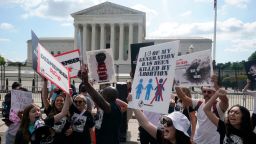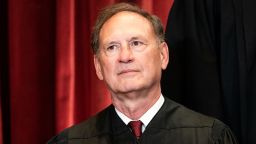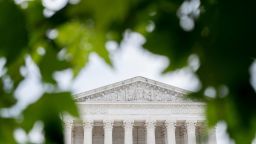Justice Samuel Alito’s majority opinion ending a federal right to abortion is the culmination of a legal career in which he has cast doubt on the grounds on which Roe v. Wade was decided.
In his opinion – which mirrored the leaked draft published by Politico in May – Alito writes that Roe “must be overruled” and was “egregiously wrong from the start.”
Born in Trenton, New Jersey, Alito was nominated by former President George W. Bush to succeed Justice Sandra Day O’Connor and ascended to the high court in 2006. He clerked for Leonard I. Garth, judge of the US Court of Appeals for the Third Circuit from 1976-1977 before becoming assistant US attorney for the District of New Jersey. In 1981, he became assistant to the solicitor general for the Department of Justice.
During his time at the Justice Department, he outlined in a 1985 memo how the Reagan administration could approach its stance on limiting abortion, writing, “we should make clear that we disagree with Roe v. Wade and would welcome the opportunity to brief the issue of-whether, and if so to what extent, that decision should be overruled.”
During his Senate confirmation hearings in 2006, Alito was asked about Planned Parenthood v. Casey, a 1991 case during his time as a judge of the US Court of Appeals for the Third Circuit in Newark, New Jersey. The case struck down a Pennsylvania law that required women seeking abortions to notify their husband and in which he was the only dissenter. The ruling was later upheld by the Supreme Court.
He was also asked about a letter in his 1985 application to be deputy assistant to the US attorney general.
“I am particularly proud of my contributions in recent cases in which the government has argued in the Supreme Court that racial and ethnic quotas should not be allowed and that the Constitution does not protect a right to abortion,” Alito wrote at the time.
Alito defended his comments in the application, saying during the 2006 hearing, “that was a statement that I made at a prior period of time when I was performing a different role” and that he would keep an open mind if the issue came before him on the Supreme Court.
“And as I said yesterday, when someone becomes a judge, you really have to put aside the things that you did as a lawyer at prior points in your legal career and think about legal issues the way a judge thinks about legal issues,” he said.
One year after his appointment, the court reversed course on an abortion controversy, upholding by a 5-4 vote a federal ban on a late-term procedure that critics called “partial birth.” In an earlier case, while O’Connor was still on the bench, the justices had struck down a similar state ban as interfering with a woman’s right to end a pregnancy. (Some medical experts have said the procedure, known medically as intact dilation and extraction, was the safest for women in certain circumstances.)
Central role in notable rulings
During his tenure on the court, Alito has drafted some of the court’s most controversial opinions, including the 2007 Lilly Ledbetter pay-discrimination case, and sided with the majority on landmark decisions.
He also sided with the 5-4 majority in a ruling on Citizens United v. Federal Election Commission, which removed long-established legal limits on campaign spending by corporations and unions. The decision prompted sharp criticism from then-President Barack Obama during the State of the Union address in which Alito mouthed the words “not true,” a rare show of emotion from a Supreme Court justice who generally remains stoic during the addresses.
And in 2014, Alito crafted the court’s 5-4 opinion to allow a Hobby Lobby craft chain and other Christian-run for-profit corporations to escape an Obama administration rule that their insurance cover contraceptives. The regulation arose from the 2010 Affordable Care Act.
Alito wrote that the court’s conservative majority rejected the argument by the Department of Health and Human Services that “the owners of the companies forfeited all (Religious Freedom Restoration Act) protection when they decided to organize their businesses as corporations rather than sole proprietorships or general partnerships.”
“The plain terms of RFRA make it perfectly clear that Congress did not discriminate in this way against men and women who wish to run their businesses as for-profit corporations in the manner required by their religious beliefs,” Alito wrote.
This story has been updated following the publication of the opinion striking down Roe v. Wade.








